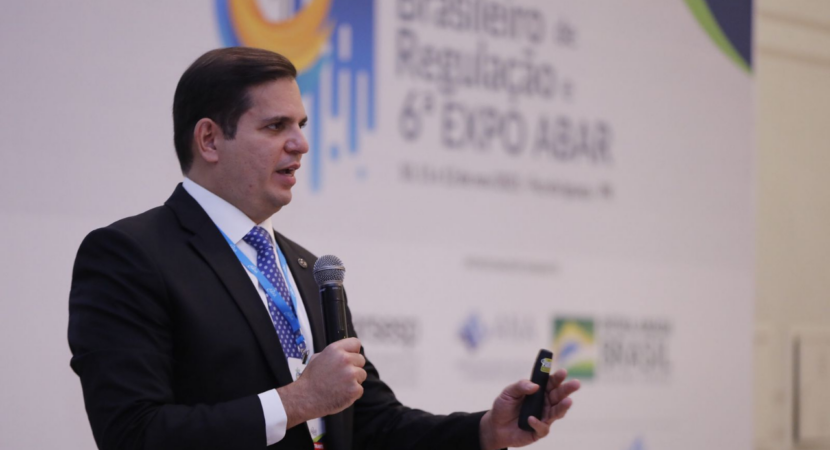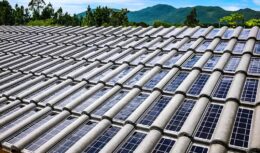
Structural challenges and market modernization are discussed by ANEEL and the Brazilian electricity sector to contain the water crisis
Panel held at the XII Brazilian Congress of Regulation and 6a Expo ABAR, promoted by ABAR (Brazilian Association of Regulatory Agencies) from November 10th to 12th, in Foz do Iguaçu (PR) discussed the biggest water crisis in the Brazilian electricity sector in recent times. Andre Pepitone, Director General of ANEEL and Federal Vice President of ABAR, discussed the modernization of the sector.
Read also
Event Opening Video
The last few years brought immense structural challenges to the Brazilian electricity sector that impacted the availability and cost of energy for consumers, in particular the effects of the pandemic and the 2021 water crisis. However, emergency actions, a context of new laws and opportunities have already pointed to results for the recovery of the electricity sector, said the Director General of ANEEL and Federal Vice-President of ABAR, André Pepitone at the congress in Foz do Iguaçu.
According to Pepitone, from ANEEL, to reduce the impacts of the water crisis on the consumer, emergency measures were taken, among them, the suspension of the power cut to some consumers during the first months of the pandemic and the carrying out of an operation to rescue the sector. electricity in the order of R$ 15,3 billion, with the withdrawal of this working capital from companies it was possible to dilute in five years the impacts that would be passed on to consumers in 12 months.
In 2021, reinforced by the pandemic scenario, Brazil experienced the biggest water crisis in the last 2021 years in 90. The Southeast region, responsible for 70% of the country's supply, currently operates with only 17% of storage capacity.
If compared to the year of the blackout in 2001, the scenario of the water crisis could have been much worse. Thanks to the diversification in recent years of the Brazilian energy matrix, where hydroelectric plants currently account for 60% of the total generated in the country – it was possible to avoid worse consequences such as in the year of the blackout, when the energy matrix was 85%. If this were the current scenario, the reservoirs in the Southeast would have only 2% of their water volume.
As highlighted at the event in Foz do Iguaçu, the director of ANEEL, in the last 20 years, the advances in the expansion and transmission of the energy sector were greater than in all Brazilian history. He highlighted that this was fundamental to face the water crisis. Currently, alternative sources such as solar, wind and biomass energy together represent more than 20% of the total produced. “The issue of supply is over, now the challenge is to look at costs, which were high due to these problems, added to the high dollar and the increase in the IGP-M and IPCA”, highlighted Pepitone, from ANEEL.
According to Rui Altieri, chairman of the Board of Directors of the Electricity Trading Chamber (CCEE), an opportunity lies in the thermoelectric contracts that are expiring between 2023 and 2024 and that should not be renewed with the current operators. In Altieri's view, “The thermal matrix has been modernized a lot in recent years. The new contracts will demand the use of new technologies and greater operational efficiency to reduce costs”, he comments.
“There is a consensus in the sector that the current framework is out of date in several aspects, and this explains the modernization agenda, which is a look to the past, to understand what we have, and another to the future. There are three key issues in this process: there is no turning back from the opening of the market; it is necessary to think about the transformation of the matrix and the use of new technologies; in addition to adjusting costs, charges and risks for the market”, defines Thiago Barral, president of the Energy Research Company (EPE), linked to the Ministry of Mines and Energy and responsible for developing national energy planning studies.
According to Pepitone, from ANEEL, the future of the sector lies in the opening of the free market, in the use of new technologies, renewable sources and in the sector's legal security. Recent investments and successful privatization auctions have shown that, even in crisis scenarios such as the energy crisis, the Brazilian energy market is trusted by investors. And it will take more to proceed with the modernization of the sector, around R$ 535 billion until 2030, calculates the director.
Water crisis commission approves work plan in the Senate and provides for hearings and technical visits to ANA, ANEEL and ONS
On Thursday, November 18, 2021, according to information released by the Senate, the Hydroenergetic Crisis Commission began the discussion of the work plan responsible for investigating the causes and effects of the water crisis that plagues the country. The vote on the work plan will take place at the next Commission meeting, scheduled for November 25th.
National Institute of Meteorology (Inmet) starts releasing climate forecasts for the next six months to benefit agricultural crops and help the energy sector.
According to information from inmet, a Federal Government agency, the release of climate forecasts for the next six months will benefit agricultural crop planning, which will have more predictability when it comes to sowing the crop for rural producers and in energy generation strategies.
The service offered by Inmet will also help the electricity sector. As released by INMET, the weather forecast for the next six months will allow for more accurate power generation planning, observing the end of the rainy season. With a longer forecast in the face of a water crisis, for example, it is possible to revert to the use of thermoelectric energy until a possible solution is found.













Army summons Brazilians with up to…
Come be a watermelon, you too
Air Force F-16 fighters…
Everything is fine, 100-year secrecy,…
Air Force F-16 fighters…
Well... It's flying scrap... Typical...
Air Force F-16 fighters…
Which genocide are you talking about? Than…
They discover the third largest deposit…
That’s why all foreigners and NGOs…
I would buy it right away without a doubt...
Problem is the evolution of technology, how many years…
Exactly that my brother
Did you say SCAM??? Then ask…
I have high school I can…
I love
People have a vision of China…
In China, a university professor earns equivalent…